#also she literally made her believe dr brenner was there to try and manipulate her decisions...
Text
sorry but i dont think kali was the first person to let el be independent
#byler#i've seen take take multiple times and i think its just not true#as kali did what almsot everyone else did#she changed her appearance told her what decisions were more right and which wrong used her to get rid of the bad men#and this isnt me saying that kali didnt care about her because i 100% believe she did (hint hint why she cried) but she still didn't let el#be completely herself & independent#kali prasad#el hopper#also she literally made her believe dr brenner was there to try and manipulate her decisions...#so yeah max was the first one to let el be independent and see her more then mainly just her powers#yes max thinks els powers are cool but it's not the main thing she sees her as she sees her as a normal person who can make their own#choices!!
34 notes
·
View notes
Text
Time for some theory on the prequel!
What if the exorcism and the massacre happened the same night and this is one of the plot twists of the prequel?
I could be wrong, but I always found it strange that they angered the "demon" but he didn't attack them immediately. The soldiers hurt possessed Will, and a few hours later he sends them to die. And the exorcism happens the same night.
Also, Kate Trefry wrote both The Spy and The First Shadow. She was definitely thinking about the Creels when she wrote that episode

I think it's interesting that in S2 the massacre happens before the exorcism. Maybe this means that Henry was still himself before the exorcism, but then something changed?
Basically, Will was saved by the exorcism, but in 1959 the exorcism made everything worse.


Henry saying: 'She (Virginia) called a doctor, an expert' reminds me so much of The Exorcist.
Virginia calls a doctor, but we don't see him, but then Henry says that he was desperately trying to escape him. Martin Brenner. Maybe Henry is describing the "exorcism". But his and Victor's memories have been manipulated. Victor was found wandering on the side of the Highway, a parallel with one of the stories Terry investigated, so either they messed with their memories, or there's some time trickering going on, as a consequence of the exorcism.
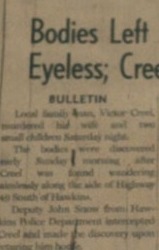
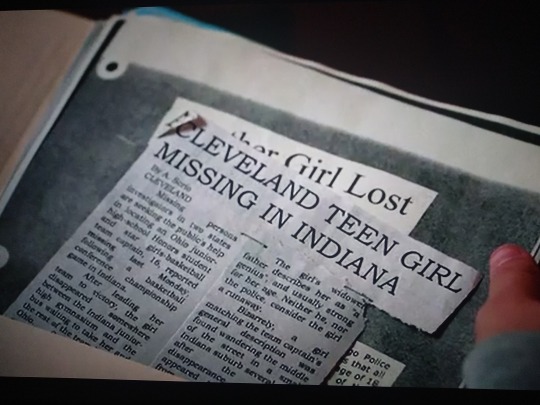
Also, I'm not the only one who noticed that many things look staged. In his monologue Henry says that people perform in a silly play, day after day, some of the Nina shots look so staged that there's even the "curtain" falling and an opera song playing. And the prequel about Henry is literally a play where the characters will also perform in a play. In every season there are mentions of living in a bubble, dreams, fakers, and people ruining the game. So the fact that we saw the night of the massacre doesn't mean that that's what really happened.
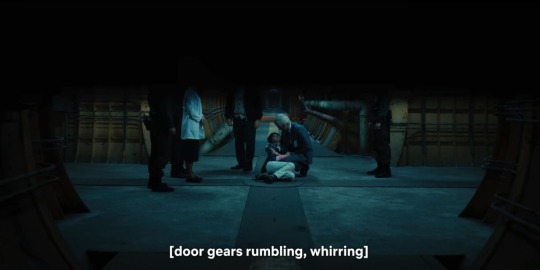

In fact, Victor doesn't mention the exorcism, but he talks about the massacre, and when he says that he thought that the demon would take him too, we hear Alice's screams and the Demogorgon. But there isn't any creature in the flashbacks. Unless it's not an actual creature, but another type of monster. Dr Brenner. That would mean that he was there, more evidence that we didn't see what really happened.
Brenner is in the play, so we're finally gonna see what he did. We need some answer before S5!
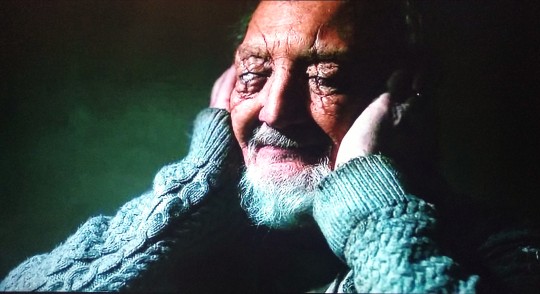
Then there's the parallel with Hopper. The two cursed fathers in prison. Hopper hears the Demogorgon too, after he tells Enzo that the curse started when he was 18, (in 1959), and he mentions Uncle Sam. So this scene seems to imply that Sam Owens is connected to the curse.
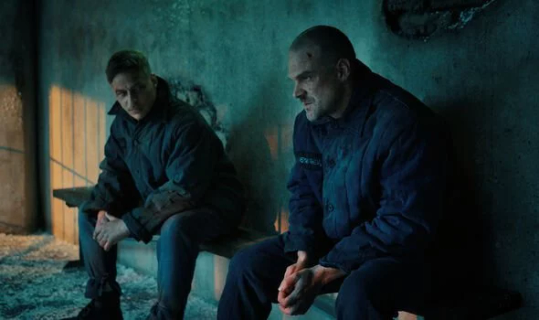
Other parallels between the prequel and 2x06.
Hopper, Joyce, Bob are in 2x06 and in the prequel. Owens is in 2x06, he is connected to the curse, and has parallels with two fathers: Hopper
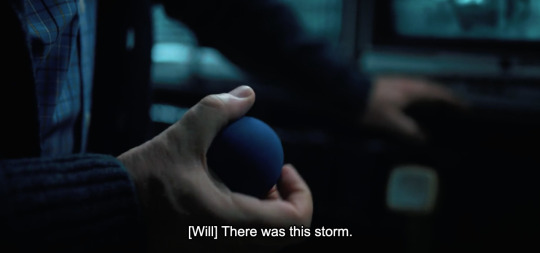
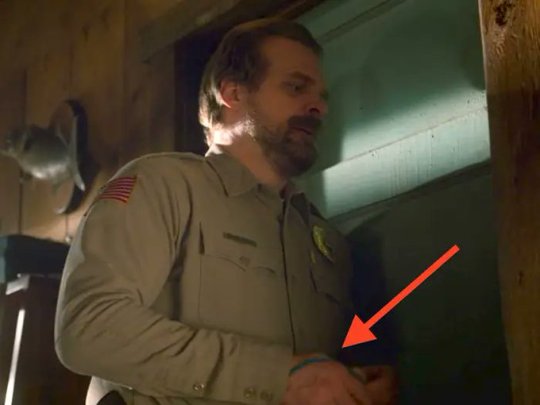
And Walter Bishop, who also has a son named Peter (Henry's fake name was Peter Ballard) I wrote about other parallels with Fringe here, including Mike's memory of the first time he and Will met. I have so many thoughts on Owens and his role...

Not sure who has Mike's role in the prequel. I thought Scott Clarke made sense, but maybe it's Patty. I don't think Henry is in love with her tho. And maybe that's the point. Patty is falling for Henry, but if he doesn't reciprocate, if he doesn't really trust her, maybe that's why she couldn't help him in the end. Will and Mike, on the other hand, have a deep connection and trust each other completely. And that helped Will to communicate with them.
I know that Mike and Will have been best friends since they were little kids, and Patty and Henry just met. But after a certain monologue people believe that between Mike and El it was love at first sight... So the prequel could show that, no, it doesn't work like that.
Other people have already talked about this shot. Cross, gates. And now we know that Bob was the son of a preacher. Another connection to the exorcism.
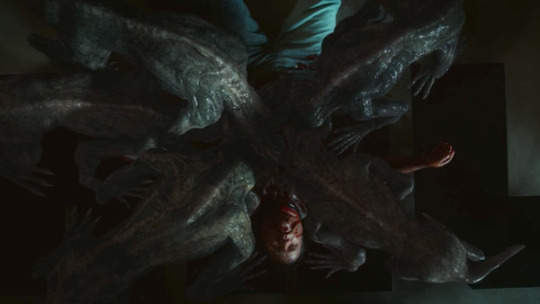

Also, if the exorcism and the massacre happened the same night, maybe the word Friend behind Will here is a reference to someone who tried to help Henry in 1959.

I have a crazy theory about Brenner, the exorcism, the demogorgon and why there's so much blood in the lab, but for now I'll just say this: if Brenner is in the shed scene, in Will's mind, when Joyce says that his birthday is on March 22, she would be right, because Matthew Modine was born on March 22, 1959.
If they really did it, they're insane, lmao!
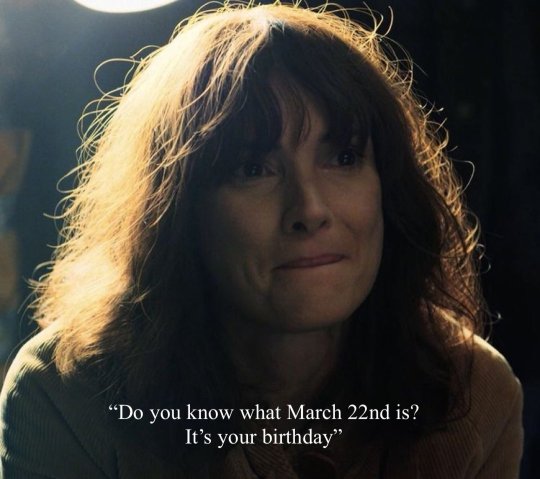
#byler#st the first shadow#the first shadow#henry creel#will byers#mike wheeler#peter ballard#st parallels#st theory#stranger things
19 notes
·
View notes
Text
Fathers in Stranger Things
This recent conversation about family acceptance in ST has made me think a lot about fathers in the show. I believe that a central theme in the story is acceptance. Acceptance of the supernatural, acceptance of differences, acceptance of one another. This dovetails into other key themes - forgiveness, friendship, and love - but in the context of parents and, specifically, Mike and Will, I think acceptance is an interesting way to think about how fathers or father figures play in their eventual relationship.
Every father on the show is an absent figure. This is for two reasons: to illustrate how much more hands-off raising children was in the 80s; and to highlight the role mothers play in the development of our characters. This also links into broader, structural themes, such as heterosexuality, patriarchy, and gender roles. On a simple level, the fathers are absent because it is the mothers who do the child rearing. This absence, however, also reveals the lack of paternal support in the lives of our core characters, and as a result, the supplementation of father figures. This dovetails into a theme that carries throughout the show - that of found families - but when it comes to Mike and Will’s development, together and separately, this relates importantly to how they will come to see themselves as young, probably gay, men.
Fathers
To start, I’ll briefly overview the main fathers of the series. We can largely group them as absent but harmless, or absent and harmful.
Ted Wheeler is an apathetic feature in Mike’s life. He is typically involved in scenes that underscore the domestic discord of the Wheeler household, and his role is primarily to show how unhappy Karen is in their marriage, and how his children do not connect with him. While there are some indications that he cares for his children, these are not carried through onscreen and, for the most part, Ted does not participate in raising Nancy or Mike.
Lucas’ father, Mr Sinclair, is presented once in association with his wife, Mrs Sinclair. Their breakfast table scene is used to show the dynamic of the Sinclair household, and for Lucas to ask his parents abstract advice on how to win Max back after their argument. Mr Sinclair makes some period-typical comments that are intended to be funny, but they also indicate that Lucas was brought up in a fairly stereotypical atmosphere (to paraphrase: “What do you do if mom’s mad at you?” / “Yes, what do you do?” / “Your mother is never wrong”). You could go all galaxy brain and say this is a nod to Joyce Byers - who spends a lot of the show trying to prove she’s right - but as this is the sole scene that features Lucas’ parents, it is our only insight into their familial dynamic, and therefore our only frame of reference as to how Lucas is raised.
Dustin’s father is not mentioned in canon and it appears he was raised in a single-parent household. With no evidence to the contrary, we can go ahead and assume that Dustin’s only meaningful parental relationship is to his mother, with whom he has a strong bond.
Lonnie Byers is an undesirable and unreliable father who left Joyce and his sons before canon. When he does reappear in S01, he is proved yet again to be a grifter looking to take advantage of Will’s disappearance and assumed death. It it subtly indicated that Lonnie was abusive to Jonathan (“You’ve gotten stronger”) and, it’s possible, to Joyce or Will too. He is certainly proved to be homophobic (“Lonnie used to call him a qu**r, said he was a f*g” / “Is he?”). Lonnie may be entirely physically absent, yet his impact on Will resonates through the story, and in a figurative sense, he is very much present.
Steve’s father is, similarly to Ted, indicated to be a work-focused man who is rarely around the Harrington household. In S01 he goes on a work trip and is accompanied by his wife (“My mom doesn’t trust him” / “Probably a good thing”) which indicates he may have been unfaithful to Mrs Harrington in the past. He is a very literal absence in Steve’s life yet appears off-screen as a forceful presence (“My dad is a grade-A asshole”) that shapes Steve’s life, culminating in S03 with Steve’s job at the mall.
The biological father of Billy and Max’s step-father, Mr Hargrove, is an abusive, sexist, and dangerous man, whose impact on Billy is so severe that it renders him vulnerable to possession by the Mind Flayer and eventually results in Billy’s death. When El goes into Billy’s memories in the S03 finale, we see how Mr Hargrove used sports to bully and antagonize his son into performative masculinity, and how he often resorted to physical violence against Billy and his late mother. Our other insight into Mr Hargrove’s paternal presence is through Max, whose behaviour indicates that while she is, possibly, partly protected by her mother, she is not protected from Billy, who takes his anger with his father out on her. Max is cagey about the full impact of Mr Hargrove, but is it subtle and sufficient enough to show that he is among the most dangerous male characters in the series so far, and his onscreen absence, like Lonnie, resonates figuratively in the lives of our characters.
The final father figure to discuss is Dr Brenner. Brenner is cold and remote in that he is the PI of a government-funded underground project modeled on MK Ultra, and thus treats Eleven like the scientific subject she is. Brenner’s acts of care are only figured as manipulation tactics (such as talking quietly yet firmly to El, carrying her from the solitary confinement cell when she kills the guard, allowing her a toy lion) and cannot in good conscience be considered parental kindness. Brenner’s power over El is so potent that Kali draws on their shared memory of Brenner in S02 to capitalise on El’s powers. El perceives Brenner as a father (“Papa”). Like Lonnie and Mr Hargrove, Brenner’s absence lingers and retains a hold over El.
As we can see, you have absent but harmful figures like Dr Brenner, Lonnie, and Mr Hargrove, and absent but harmless figures like Ted, Dustin’s father, Mr Sinclair, and even, to an extent, Mr Harrington. This rough categorisation helps us see that the show’s fathers are painted into a conspicuous binary that reflects the expectations placed on our characters as they learn to become men. Are they jocks or nerds? Straight or gay? In the world of Reaganite Hawkins, society is bookended by the normal and acceptable, or the abnormal and unacceptable. In this context, fathers - and to a larger extent, masculinity - either exist passively or aggressively, and both impact our characters either overtly (Billy and Will) or subliminally (Mike and Lucas).
Father figures
The characters above stand in stark contrast to the father figures presented in the series. These include Hopper, Bob, Mr Clarke, and Steve. Quite by chance, they each represent different elements of masculinity and different figures of power in the lives of our main cast.
Mr Clarke, for example, is representative of institutional power (a teacher) and has a strong influence over the Party in encouraging their curiosity and natural interest in science and the world around them. He is not typically masculine - he is a nerd - but he gently guides the Party through school and is shown to care for them.
Bob is representative of a found father figure in that he steps into the Byers’ life in no permanent sense (“This is not a normal family” / “But it could be”), but his respect of Joyce’s boundaries nevertheless sees him exercise a positive influence over Will (Jonathan, by Bob’s own admission, is harder to crack - understandable, given Jonathan’s past with Lonnie and, possibly, other men Joyce has occasionally had in her life). Bob’s absence - his death - is palpable, and leaves a lasting impression on Joyce, who is arguably in mourning for a good part of S03. In a similar vein, you can also make the argument that Jonathan is a father figure to Will (but that deserves its own post).
Steve represents more of a big brother role to the rest of the Party, but it is possible to see Steve as a father figure to Dustin, particularly over the course of S02. Steve drives Dustin to the dance, gives him advice on girls (a stereotypical “dad talk”), protects him, and supports him. In S03 their relationship has shifted into more of a friendship, but that does not take away from their initial dynamic that had a paternal undertone to it.
These are all examples of father figures. But the most important example of this is Hopper, and it is because he subverts this mold. Aside from the obvious link to El, in that he raises her from S02 and even becomes her “father” (Jane Hopper), it is not Hopper’s absence as a father that is important, but the absence of his daughter. Hopper is therefore an inverted male character. The absence (death) of his daughter stands in binary to the Party’s biological fathers, who are otherwise the absent ones. In contrast, Hopper is very present. Hopper is a father in the literal sense, but he is a father figure to Mike and Will: Mike, through his relationship with El and in the absence of Ted (Hopper gives Mike the “dad talk” in S03); and Will through Hopper’s relationship with Joyce. Hopper’s absent daughter is substituted most clearly by El. But in an abstract way, he also fits that role with Mike and Will too. In sum, Hopper’s absence as a biological father is redeemed when he becomes a father figure to other characters. He is therefore neither harmful or harmless, and can be seen as an outlier - but that is deliberate. It is deliberate because he and Joyce are the only parents/parental figures who know and understand the supernatural in Hawkins. I suspect that by the end of the series, Karen may be drawn into the fold too.
Mothers
I mentioned at the start that the absence of fathers highlights the role that mothers play in the series. This is best understood - and perhaps only understood - with direct reference to Karen Wheeler and Joyce Byers. Karen and Joyce have huge roles to play in how Mike and Will will come to understand themselves. They do this in spite of the male absence in Mike and Will’s lives, because a central theme of the ST story is love, especially maternal love.
Karen Wheeler is introduced as a typical housewife whose role it is to care for her children - Nancy, Mike, and Holly - and take care of the Wheelers’ home. She is in an unhappy marriage with Ted, and is unhappy enough to consider having an affair with Billy in S03. It is her sense of duty that prevents her from carrying this out. Karen is repeatedly shown to reach out to her children and frequently offers emotional support (most potently in S01-2, S03 being the sole exception [“It’s hard to keep track. You know what it’s like - summer!”]). Despite their rebuffs Karen does not give up trying to support her children. She is occasionally successful (Mike comes to her for comfort once per season, and she and Nancy are shown to have a tumultuous but altogether strong relationship, culminating in the S03 kitchen speech scene) yet, arguably, Mike and Nancy’s willfulness and growing up is a point of frustration and another source of unhappiness. While it will blow over - they are both teenagers - in the context of the show their rejection of her emotional support further reinforces her isolation. It is important to note that while Mike does crumble and come to her for comfort, this happens only in times of duress (Will’s disappearance, Will moving away). In other words, Mike does not rely on his mother for emotional support but she is still his mother, and when he does come to her it is during Mike’s emotional high points. These are always linked to Will. This directly ties Mike’s emotional development as it relates to Will to the maternal support given by his mother.
Joyce Byers is, as we all know, the resident PFLAG rep. Her relationship with Will is a central element of the story, and it is strengthened not despite Lonnie’s absence but in spite of it. It is moot to think of how Joyce and Will would have developed if Lonnie had stayed in canon, because Joyce is repeatedly shown to be driven by the love for her children. What is essential to understand about Joyce is that she is an atypical parent. She is a single working class mother whose brushes with normality (e.g. Bob) are taken away by the supernatural. As mentioned before, this further highlights the thematic divide between normality/abnormality and visible/invisible that are staples to the plot. In other words, Joyce has not found her “normal”, because Will has not yet found his normal. Until that happens, her happiness is at stake, partly because it is tied to the happiness of her children, but because Will’s overarching influence over the supernatural elements in the story is inextricably tied to his sense of belonging. Joyce, unlike Karen, has already won her child’s trust and support. Will’s story, therefore, is linked more closely to the absence of his father, whereas for Mike, it is not the absence of his father that is to be overcome, but his aversion to connecting with Karen.
Mike and Will
Taken together, I believe that when it comes to Mike and Will and their respective sexuality, it is not the fathers that will figure in their coming out, but their mothers. The show plays on the absence of fathers and places them in opposition to the presence of mothers. It is maternal love that guides Mike and Will, and it is maternal love that will protect them. This concept is only subverted by El and Hopper’s relationship, for it is El’s mother and Hopper’s daughter who is absent, therefore implying that they are contradictions, or inversions, of the show’s presentation of the familial.
Mike’s relationship with Ted is not a model. Aside from Ted’s general apathy towards his children - he demonstrably leaves the discipline and care of their children to Karen, as evidenced by every family scene in which Karen makes the decisions and Ted remains silent - he appears to have given up in connecting with Mike as his son. I mentioned before how Mr Hargrove used sports to coerce Billy into performative masculinity; the same can be said of Will, who disliked it when Lonnie took him to baseball games, and even destroys Castle Byers with a baseball bat. In contrast, Mike’s baseball bat (picked up in S01 by Nancy, who pretends to be practicing for the softball team) is in the garage, indicating it is not used, if it ever was. Arguably, Mike’s insistent and forceful personality might have bowled the passive Ted over, but Ted’s disconnect to his son is also evidenced in S01 when Ted jokes, “Our son, with a girl?” I have discussed here how this line was a blatant reference to Mike’s “nerd” status. As S03 has proved, the Duffers rely on 80s tropes to sublimate existing themes in their story. With nerds typically understood in 80s cultural discourse as sexually and romantically inexperienced social loners, Ted’s comment betrays three things: how he perceives his son; the failed expectations for his son; and how the audience is meant to understand Mike as a character. Ted does not feature in Mike’s upbringing, and I think this is deliberate for two reasons: to underscore how traditional Mike’s upbringing is; and to foreshadow that it will not be Ted’s opinion of Mike that matters in the end. It will be Karen’s.
Will’s relationship with Lonnie is, as presented onscreen in canon, non-existent. It only plays out off-screen and we have not yet seen Will and Lonnie interact in person. Regardless of where you stand with the theory that Lonnie’s abuse manifested in Will to become the Mind Flayer (I personally agree with it), Lonnie’s eventual presence in the show will be a critical moment and, likely, the climax of the entire series. As addressed above, Lonnie is indicated to be homophobic, if not abusive, to Will in the past. I won’t touch on the abuse as that is largely hearsay at the point of writing this post, however the homophobic language is canon and therefore has a bearing on how we are expected to interpret Will and his relationship to 1) other boys/men, and 2) his sexuality. Both Mike and Will have no meaningful relationship with their fathers. Yet, while Mike’s father is absent and harmless, Lonnie is absent and very much harmful. Thus, the lasting influence of his absence is made more potent by the power of Will’s memories/imagination. Having been subjected to direct homophobic bullying, Will’s sexual identity is tied very much to his relationships with older men, with Jonathan, Bob, and to an extent, Mr Clarke, as positive representations of masculinity, and Lonnie on the other end of the spectrum. To Will, Lonnie may be physically absent but he is figuratively present. As such, it will not be Lonnie’s reaction to Will’s sexuality that is important. It will be Will’s overcoming of Lonnie’s hold over him that will be the defining moment in his character arc.
Parental absence is key to Mike and Will’s development together and individually. Both Mike and Will have to overcome their absent fathers in different ways. The key to this will be breaking free of the societal expectations placed on them, drawing strength in maternal love, and, crucially, finding love and acceptance with each other. The defining point is that despite surface-level indications to the contrary, it is not the fathers who are important: it is the mothers.
50 notes
·
View notes